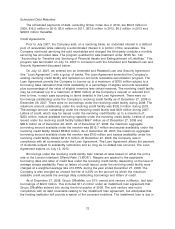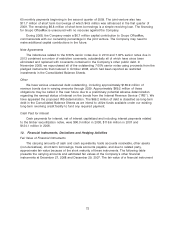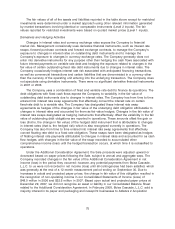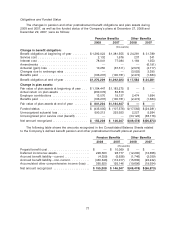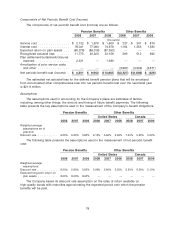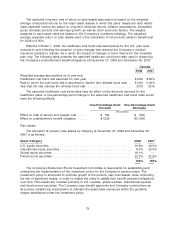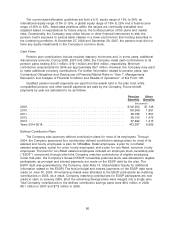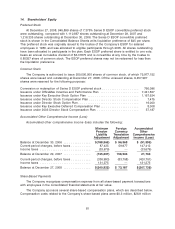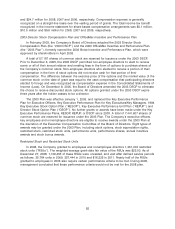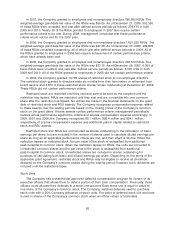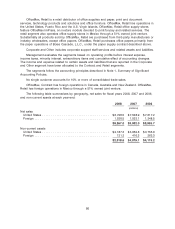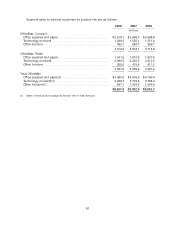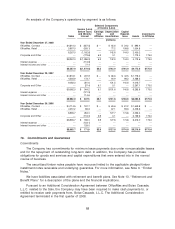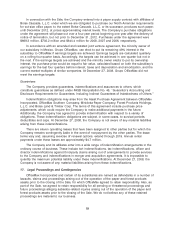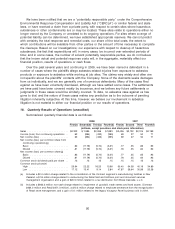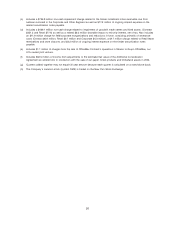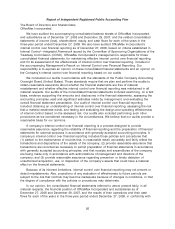OfficeMax 2008 Annual Report Download - page 86
Download and view the complete annual report
Please find page 86 of the 2008 OfficeMax annual report below. You can navigate through the pages in the report by either clicking on the pages listed below, or by using the keyword search tool below to find specific information within the annual report.and $24.7 million for 2008, 2007 and 2006, respectively. Compensation expense is generally
recognized on a straight-line basis over the vesting period of grants. The total income tax benefit
recognized in the income statement for share-based compensation arrangements was $0.1 million,
$10.5 million and $9.6 million for 2008, 2007 and 2006, respectively.
2003 Director Stock Compensation Plan and OfficeMax Incentive and Performance Plan
In February 2003, the Company’s Board of Directors adopted the 2003 Director Stock
Compensation Plan (the ‘‘2003 DSCP’’) and the 2003 OfficeMax Incentive and Performance Plan
(the ‘‘2003 Plan’’), formerly named the 2003 Boise Incentive and Performance Plan, which were
approved by shareholders in April 2003.
A total of 57,187 shares of common stock are reserved for issuance under the 2003 DSCP.
Prior to December 8, 2005, the 2003 DSCP permitted non-employee directors to elect to receive
some or all of their annual retainer and meeting fees in the form of options to purchase shares of
the Company’s common stock. Non-employee directors who elected to receive a portion of their
compensation in the form of stock options did not receive cash for that portion of their
compensation. The difference between the exercise price of the options and the market value of the
common stock on the date of grant was equal to the cash compensation that participating directors
elected to forego and was recognized as compensation expense in the Consolidated Statements of
Income (Loss). On December 8, 2005, the Board of Directors amended the 2003 DSCP to eliminate
the choice to receive discounted stock options. All options granted under the 2003 DSCP expire
three years after the holder ceases to be a director.
The 2003 Plan was effective January 1, 2003, and replaced the Key Executive Performance
Plan for Executive Officers, Key Executive Performance Plan for Key Executives/Key Managers, 1984
Key Executive Stock Option Plan (‘‘KESOP’’), Key Executive Performance Unit Plan (‘‘KEPUP’’) and
Director Stock Option Plan (‘‘DSOP’’). No further grants or awards have been made under the Key
Executive Performance Plans, KESOP, KEPUP, or DSOP since 2003. A total of 7,441,607 shares of
common stock are reserved for issuance under the 2003 Plan. The Company’s executive officers,
key employees and nonemployee directors are eligible to receive awards under the 2003 Plan at
the discretion of the Executive Compensation Committee of the Board of Directors. Eight types of
awards may be granted under the 2003 Plan, including stock options, stock appreciation rights,
restricted stock, restricted stock units, performance units, performance shares, annual incentive
awards and stock bonus awards.
Restricted Stock and Restricted Stock Units
In 2008, the Company granted to employees and nonemployee directors 1,261,404 restricted
stock units (‘‘RSUs’’). The weighted-average grant-date fair value of the RSUs was $23.00. As of
December 27, 2008, 1,109,453 of these RSUs were unvested, and vest after defined service periods
as follows: 35,784 units in 2009, 257,444 in 2010 and 816,225 in 2011. Nearly half of the RSUs
granted to employees in 2008 also require certain performance criteria to be met. During 2008,
management concluded that these performance criteria would not be met for the 2008 plan.
82


